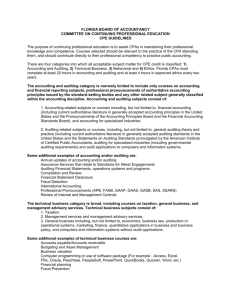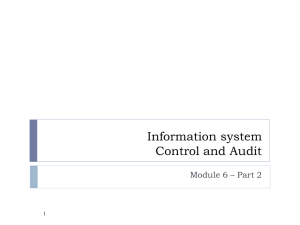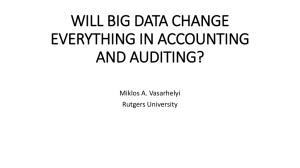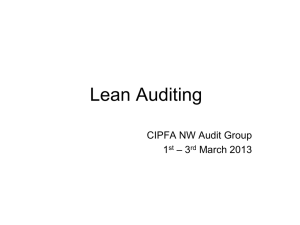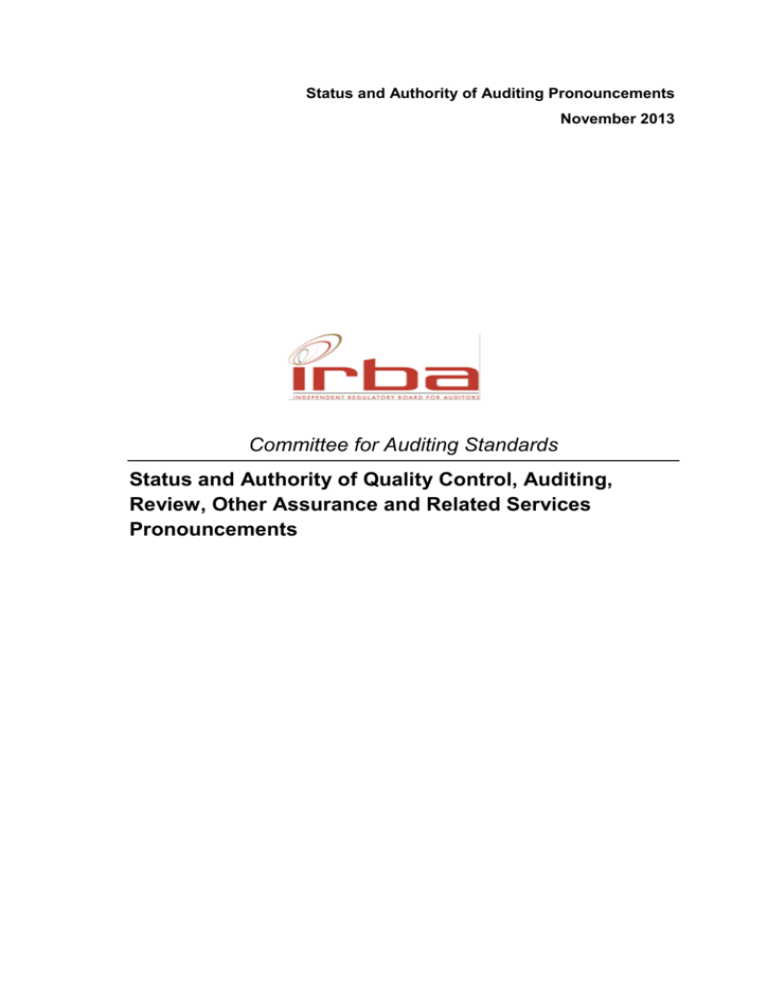
Status and Authority of Auditing Pronouncements
November 2013
Committee for Auditing Standards
Status and Authority of Quality Control, Auditing,
Review, Other Assurance and Related Services
Pronouncements
Independent Regulatory Board for Auditors
PO Box 8237, Greenstone, 1616
Johannesburg
This Status and Authority of Quality Control, Auditing, Review, Other Assurance, and
Related Services Pronouncements (“Status and Authority of Auditing Pronouncements”),
was prepared by the Committee for Auditing Standards (CFAS) of the Independent
Regulatory Board for Auditors (IRBA) and was approved for issue in November 2013.
This Status and Authority of Auditing Pronouncements is issued to facilitate an
understanding of the status and authority of the auditing pronouncements developed,
adopted, issued and prescribed by the IRBA.
The IRBAs legislative mandate
The objects of the Auditing Profession Act, 2005 (Act No 26 of 2005) (the “Act”) are set out
in section 2 and include, inter alia:
(c) “to approve the development and maintenance of internationally comparable ethical
standards and auditing standards for auditors that promote investment and as a
consequence employment in the Republic; and
(d) to set out measures to advance the implementation of appropriate standards of
competence and good ethics in the auditing profession;”
To give effect to the objects of the Act, section 4 of the Act sets out the general functions of
the Regulatory Board (the “IRBA”), including that “the Regulatory Board must, in addition to
its other functions provided for in this Act” take steps to meet certain specific requirements.
These include section 4(1) which specifies that the IRBA must:
(c) “prescribe standards of professional competence, ethics and conduct of registered
auditors;” and
(e) “prescribe auditing standards”.
To enable the IRBA to meet these requirements, section 4(2)(a) states that “the IRBA may
participate in the activities of international bodies whose main purpose it is to develop and
set auditing standards and to promote the auditing profession;”.
The Committee for Auditing Standards
The statutory responsibility of the CFAS is set out in section 22(2) which requires that “the
committee for auditing standards must assist the IRBA to:
(a) develop, maintain, adopt, issue or prescribe auditing pronouncements;
(b) consider relevant international changes by monitoring developments by other
auditing standard-setting bodies and sharing information where requested; and
(c) promote and ensure the relevance of auditing pronouncements by
i.
considering the needs of users of audit reports;
ii.
liaising with other committees of the Regulatory Board on standards to be
maintained by registered auditors and by receiving feedback from such
committees on areas where auditing pronouncements are needed;
iii.
ensuring the greatest possible consistency between auditing pronouncements
and accepted international pronouncements; and consulting with professional
bodies on the direction and appropriateness of auditing pronouncements; and
iv.
consulting with professional bodies on the direction and appropriateness of
auditing pronouncements.”
2 of 11
The Status and Authority of Auditing Pronouncements may be downloaded free of charge in
PDF format from the IRBA website at http://www.irba.co.za.
The IRBA does not accept responsibility for loss caused to any person who acts or refrains
from acting in reliance on the material in the IRBA auditing pronouncements, whether such
loss is caused by negligence or otherwise.
Copyright © November 2013 by the Independent Regulatory Board for Auditors (IRBA), all
rights reserved. Permission is granted to make copies of this work provided that such copies,
in whichever format, are for the purpose of registered auditors discharging their professional
duties, for use in academic classrooms or for personal use and provided such copies are not
sold or disseminated and provided further that each copy bears the following credit line:
“Copyright © November 2013 by the Independent Regulatory Board for Auditors. All rights
reserved. Used with permission of the IRBA.” Otherwise, written permission from the IRBA is
required to reproduce, store or transmit or to make other similar uses of this document
except as permitted by law.
3 of 11
TABLE OF CONTENTS
STATUS AND AUTHORITY OF QUALITY CONTROL, AUDITING, REVIEW, OTHER
ASSURANCE AND RELATED SERVICES PRONOUNCEMENTS
(Effective from 1 December 2013)
CONTENTS
Page
Introduction ............................................................................................................................ 5
Adoption of International Standards on Quality Control, Auditing, Assurance and Related
Services ................................................................................................................................. 5
Adoption of the IESBA Code of Ethics for Professional Accountants...................................... 6
Authority of the IAASB’s Pronouncements adopted and prescribed ....................................... 7
Authority of Pronouncements issued by the IRBA .................................................................. 7
South African Standards .................................................................................................... 7
South African Practice Statements .................................................................................... 8
South African Guides......................................................................................................... 9
IRBA Communiqués ........................................................................................................ 11
Existing pronouncements ................................................................................................ 11
Language ........................................................................................................................ 11
4 of 11
STATUS AND AUTHORITY OF QUALITY CONTROL, AUDITING, REVIEW,
OTHER ASSURANCE AND RELATED SERVICES PRONOUNCEMENTS
Introduction
1. This Status and Authority of Quality Control, Auditing, Assurance and Related Services
Pronouncements (“Status and Authority of Auditing Pronouncements”) is issued to
facilitate an understanding of the status and authority of the auditing pronouncements
developed, adopted, issued and prescribed by the Independent Regulatory Board for
Auditors (the IRBA).
2. Auditing pronouncements are defined in section 1 of the Auditing Profession Act, No 26
of 2005 (“the Act”) as meaning “those standards, practice statements, guidelines and
circulars developed, adopted, issued or prescribed by the Regulatory Board which a
registered auditor must comply with in the performance of an audit1” referred to hereafter
as “auditing pronouncements”.
3. The statutory responsibility of the Committee for Auditing Standards (CFAS) is to assist
the IRBA to develop, maintain, adopt, issue or prescribe auditing pronouncements, to
consider relevant international changes by monitoring developments by other auditing
standard-setting bodies and sharing information where requested; and to promote and
ensure the relevance of auditing pronouncements by developing and maintaining
auditing standards which are internationally comparable2.
4. The CFAS is committed to the International Auditing and Assurance Standards Board’s
(IAASB’s) goal of global convergence to ensure International Pronouncements are
generally accepted worldwide. Consequently, the CFAS seeks to ensure
pronouncements developed and issued by the IRBA are consistent with the IAASB’s
International Pronouncements that are to be applied by registered auditors (“auditors”) in
South Africa. The CFAS acts in the common interest of the public at large to create the
framework and principles that contribute to the protection of the public who rely on the
services of auditors and to support auditors who carry out their duties competently,
fearlessly and in good faith.
5. The Status and Authority of Auditing Pronouncements is to be read together with the
Preface to the International Quality Control, Auditing, Review, Other Assurance and
Related Services Pronouncements published in the IAASB Handbooks of International
Quality Control, Auditing, Assurance and Related Services Pronouncements, which are
adopted and prescribed by the IRBA.
6. The Status and Authority of Pronouncements clarifies the status and authority of
standards, practice statements and guides (“auditing pronouncements”) developed by
the CFAS and issued by the IRBA.
Adoption of International Standards on Quality Control, Auditing,
Assurance and Related Services
7. The Auditing and Assurance Standards Board of the PAAB, the predecessor to the
CFAS, adopted the original text of the IAASB International Standards on Quality Control,
Auditing, Assurance and Related Services (“the International Standards”) as the
1
The definition of “audit” in section 1 includes engagements to audit or review financial statements
and other assurance engagements.
2
The Auditing Profession Act, 2005 (No 26 0f 2005), section 4 and section 22(2) (a), (b) and (c).
5 of 11
STATUS AND AUTHORITY OF QUALITY CONTROL, AUDITING, REVIEW,
OTHER ASSURANCE AND RELATED SERVICES PRONOUNCEMENTS
standards to be applied by all auditors in South Africa from 1 January 2005. PAAB
Circular B.1/2004, Adoption of IAASB Standards by the Auditing and Assurance
Standards Board sets out the adoption process followed and the effective dates of all of
the IAASB Engagement Standards. Board Circular B.1/2004, was withdrawn and
replaced by Board Notice 128 of 2009, included in Government Gazette No. 32615 of
9 October 2009.
8. Following the promulgation of the Act, effective from 1 April 2006, the IRBA confirmed
the adoption by the PAAB of the International Engagement Standards issued by the
IAASB, as published in the successive IAASB Handbooks of International Quality
Control, Auditing, Assurance, and Ethics Pronouncements, (the IAASB Handbooks)
under copyright from the IFAC3. The continued adoption and prescription for use by all
auditors in South Africa, is done in accordance with section 4(1)(e) of the Act, is effected
by gazetting periodic IRBA Board Notices4.
9. By virtue of adopting the successive IAASB Handbooks under copyright from IFAC, the
Board deemed them to have been prescribed without requiring publication of the entire
Handbook5. The adoption and prescription is communicated to auditors by Board Notice6
from time to time. Board Notices will be issued and gazetted on this basis for so long as
the IAASB Handbooks continue to be adopted and prescribed by the IRBA for use by
auditors.
10. The above covers all the IAASB’s International Quality Control, Auditing, Review, Other
Assurance and Related Services Pronouncements.
Adoption of the IESBA Code of Ethics for Professional Accountants
11. The development and maintenance of the Code of Professional Conduct for Registered
Auditors (“the Code”), and Rules Regarding Improper Conduct (“the Rules”) prescribed
for auditors, is the responsibility of the Committee of Auditor Ethics (CFAE). The Code
and Rules were approved by the Board and published by the IRBA, and gazetted as
Board Notice 89 in Government Gazette No 33305 on 18 June 2010. The IRBA adopted
the IESBA Code of Ethics for Professional Accountants (2009) under copyright
permission from the IFAC7 and published it as the IRBA Code of Professional Conduct
3
Copyright © [insert month 2013] by the International Federation of Accountants (IFAC). All rights
reserved. Used with permission of IFAC. Contact Permissions @ifac.org for permission to reproduce,
store or transmit, or to make other similar uses of this document.
4
The IRBA Board Notices are available for download from the IRBA’s website (www.irba.co.za).
5
The South African Institute of Chartered Accountants (SAICA) annually publishes the SAICA
Handbooks of Auditing and Financial Reporting Standards and Legislation Handbooks (the “SAICA
Handbooks”). The SAICA Auditing Handbook includes the IAASB Handbooks, under copyright
permission from the IFAC, adopted and prescribed by the IRBA, for use in academic classrooms or
for personal use of Chartered Accountants (South Africa) (CA (SA)), registered auditors and their
audit firms. The SAICA Auditing Handbook also includes the other auditing pronouncements issued
by the IRBA.
6
Electronic versions of the IAASB Handbooks are available for download from the IRBA’s website
(www.irba.co.za) and the IAASB website: (www.ifac.org/auditing-assurance/publications-resources).
7
Copyright © “This Code is based on Parts A and B of the Code of Ethics for Professional
Accountants of the International Ethics Standards Board of Accountants (IESBA), published by the
International Federation of Accountants (IFAC) in May 2013 and is used with permission of IFAC.
Adaptations to Parts A and B are underlined and in italics in this Code.” The SAICA Auditing
6 of 11
STATUS AND AUTHORITY OF QUALITY CONTROL, AUDITING, REVIEW,
OTHER ASSURANCE AND RELATED SERVICES PRONOUNCEMENTS
for Registered Auditors8 with additional requirements for auditors in South Africa.
Subsequent amendments to the IESBA Code of Ethics for Professional Accountants are
considered by the CFAE prior to adoption by the IRBA.
Authority of the IAASB’s Pronouncements adopted and prescribed
12. The IAASB’s pronouncements govern audit, review, other assurance, and related
services engagements that are conducted in accordance with International Standards.
They do not override the local laws or regulations that govern the audit or review of
historical financial statements, or assurance engagements on other information, required
to be followed in accordance with IRBA auditing pronouncements. In the event that local
laws or regulations differ from, or conflict with, the IAASB’s Standards on a particular
subject, an engagement conducted in accordance with local laws or regulations will not
automatically comply with the IAASB’s Standards. An auditor should not represent
compliance with the IAASB’s Standards unless the auditor has complied fully with all
standards relevant to the engagement.
13. The authority attaching to International Standards issued by the International Auditing
and Assurance Standards Board is contained in the Preface to the International Quality
Control, Auditing, Review, Other Assurance and Related Services Pronouncements
published in the IAASB Handbooks of International Quality Control, Auditing, Assurance
and Related Services Pronouncements, which are adopted and prescribed by the IRBA.
Authority of Pronouncements issued by the IRBA
14. Section 44(2)(b) read with section 44(3)(a) and section 44(3)(f) of the Act provides that
an auditor may not express an unqualified opinion on financial statements or any
supplementary information unless, inter alia, in section 44(3):
a. “the audit was carried out free from any restrictions whatsoever and in
compliance, so far as applicable, with auditing pronouncements relating to the
conduct of the audit; and
f.
that the auditor has complied with all laws relating to the audit of that entity.”
15. Section 4(1)(c) and (e) of the Act require the IRBA to prescribe standards of professional
competence with which auditors must comply in performing their duties as auditors, and
to prescribe auditing standards.
16. The auditing pronouncements of the IRBA are developed and issued following the CFAS
Due Process Policy9.
South African Standards
17. Where necessary, South African standards are developed to meet local requirements.
South African Standards contain requirements and application material on a particular
Handbook includes the IRBA Code of Professional Conduct for Registered Auditors (“the Code”), and
Rules Regarding Improper Conduct (“the Rules”).
8
The IRBA Code and Rules are available for download from the IRBA website (www.iba.co.za).
9
The CFAS “Due Process Policy for the Development, Adoption and Issue of Quality Control,
Auditing, Review, Other Assurance, and Related Services Pronouncements”
7 of 11
STATUS AND AUTHORITY OF QUALITY CONTROL, AUDITING, REVIEW,
OTHER ASSURANCE AND RELATED SERVICES PRONOUNCEMENTS
subject, whilst applying the principles in the relevant International Standards on a
consistent basis.
18. Where issued, they may govern audits, reviews, other assurance and related services
engagements and may include:
a. South African Standards on Auditing (SASAs) are to be applied in the audit of
historical financial information.
b. South African Standards on Review Engagements (SASREs) are to be applied in
the review of historical financial information.
c. South African Standards on Assurance Engagements (SASAEs) which are to be
applied in assurance engagements dealing with subject matters other than
historical financial information.
d. South African Standards on Related Services (SASRSs) which are to be applied
to compilation engagements, engagements to apply agreed-upon procedures to
information and other related services engagements as specified by the IRBA.
19. The IAASB’s International Standards on Quality Control (ISQCs) are to be applied by
registered auditors to engagements conducted in terms of South African Standards on
Auditing, Review, Other Assurance and Related Services that are developed and issued.
South African Practice Statements
20. South African Practice Statements may be developed and issued by the IRBA to provide
practical assistance to auditors in the implementation of relevant International or South
African Standards on Quality Control, Auditing, Review, Other Assurance and Related
Services.
21. South African Practice Statements developed may be in respect of Auditing, Review,
Other Assurance and Related Services (SAAPS, SAREPS, SAAEPS and SARSPS).
They do not impose requirements on auditors beyond those included in the International
or South African Standards or South African regulatory requirements, and do not change
the auditor’s responsibility to comply in all material respects with the requirements of the
International or South African Standard/s or with South African regulatory requirements
relevant to the audit, review, other assurance or related services engagement. When
appropriate, additional considerations specific to public sector entities are included within
the body of a South African Practice Statement.
22. An auditor is required to have an understanding of the entire text of every South African
Practice Statement to enable the auditor to assess whether or not any particular South
African Practice Statement is relevant to an engagement, and if so, to enable the auditor
to apply the requirements of the particular International or South African Standard to
which the South African Practice Statement relates, properly.
8 of 11
STATUS AND AUTHORITY OF QUALITY CONTROL, AUDITING, REVIEW,
OTHER ASSURANCE AND RELATED SERVICES PRONOUNCEMENTS
23. South African Practice Statements issued will contain the following wording to reflect
their status and authority:
This South African <Auditing/Review/Other Assurance/Related Services10> Practice
Statement (SAAPS/SAREPS/SAAEPS/SARSPS11) <insert name of SAAPS>
provides guidance to registered auditors (auditors) in implementing the requirements
of <the relevant International Standard/s / South African Standard/s - insert Name of
Standard/s> when <insert scope of Practice Statement12>.
South African Practice Statements are developed and issued by the IRBA to provide
practical assistance to auditors in the implementation of relevant International or
South African Standards on Quality Control, Auditing, Review, Other Assurance and
Related Services Pronouncements. South African Practice Statements do not impose
requirements on auditors beyond those included in the International or South African
Standards or South African regulatory requirements and do not change the auditor’s
responsibility to comply, in all material respects, with the requirements of the
International or South African Standards or with South African regulatory
requirements relevant to the audit, review, other assurance or related services
engagement.
An auditor is required to have an understanding of the entire text of every South
African Practice Statement to enable the auditor to assess whether or not any
particular South African Practice Statement is relevant to an engagement, and if so,
to enable the auditor to apply the requirements of the particular International or South
African Standard/s to which the South African Practice Statement relates, properly.
In terms of section 1 of the Auditing Profession Act, No 26 of 2005 (the Act), a South
African Practice Statement is included in the definition of “auditing pronouncements”
and in terms of the Act, the auditor must, in the performance of an audit, comply with
those standards, practice statements, guidelines and circulars developed, adopted,
issued or prescribed by the Regulatory Board.
South African Guides
24. South African Guides may be developed and issued by the IRBA to provide guidance to
an auditor in meeting specific legislative requirements imposed by another Regulator.
25. Guides do not impose requirements on auditors beyond those included in the
International or South African Standards on Quality Control, Auditing, Review, Other
Assurance and Related Services or South African regulatory requirements and do not
change an auditor’s responsibility to comply, in all material respects, with the
requirements of the International or South African Standards or with South African
regulatory requirements relevant to the audit, review, other assurance or related services
engagement.
26. An auditor is required to have an understanding of the entire text of every Guide to
enable the auditor to determine whether or not any particular Guide is relevant to an
10
Delete whichever is not applicable.
Delete whichever is not applicable.
12
For example, the nature or type of engagement that the Practice Statement relates to
11
9 of 11
STATUS AND AUTHORITY OF QUALITY CONTROL, AUDITING, REVIEW,
OTHER ASSURANCE AND RELATED SERVICES PRONOUNCEMENTS
engagement, and if so, to enable the auditor to apply the requirements of the
International or South African Standards, to which the Guide relates, properly.
27. Depending on the nature of the topic(s) covered, a Guide may assist an auditor in
meeting the subject specific regulatory requirements in the circumstances of the
engagement:
Obtaining an understanding of the circumstances of the entity, and in making
judgments about the identification and assessment of risks of material misstatement;
Making judgments about how to respond to assessed risks, including judgments
about procedures that may be appropriate in the circumstances; or
Addressing reporting considerations, including forming an opinion on the financial
statements and communicating with those charged with governance.
28. Joint Guides may be developed and issued by the IRBA jointly with the Auditor-General
South Africa for private sector auditors auditing in the public sector. When appropriate,
additional considerations specific to public sector entities are included In Joint Guides for
subject specific public sector topics. Joint Guides issued have the same status as South
African Guides.
29. Joint Guides also may be developed and issued by the IRBA jointly with the South
African Institute of Chartered Accountants (SAICA) to provide guidance on the
application of legislative requirements affecting both auditors and Chartered Accountants
(South Africa).
30. South African Guides issued will contain the following wording to reflect their status and
authority:
This Guide13 for registered auditors (“auditors”) <insert name of Guide> provides
guidance to <specify if relevant> auditors in implementing the audit and review
requirements in the relevant <International Standard/s / South African Standard/s> to
meet the additional regulatory reporting requirements in the <specify regulatory
requirements>.
Guides are developed and issued by the IRBA to provide guidance to auditors in
meeting specific legislative requirements imposed by a Regulator. Guides do not
impose requirements on auditors beyond those included in the International or South
African Standard/s or South African regulatory requirements and do not change an
auditor’s responsibility to comply, in all material respects, with the requirements of
the International or South African Standards or with South African regulatory
requirements relevant to the audit, review, other assurance services or related
services engagement.
An auditor is required to have an understanding of the entire text of every Guide to
enable the auditor to assess whether or not any particular Guide is relevant to an
engagement, and if so, to enable the auditor to apply the requirements of the
particular International or South African Standard/s to which the Guide relates,
properly.
13
Adapt for Joint Guides where applicable.
10 of 11
STATUS AND AUTHORITY OF QUALITY CONTROL, AUDITING, REVIEW,
OTHER ASSURANCE AND RELATED SERVICES PRONOUNCEMENTS
In terms of section 1 of the Auditing Profession Act, No 26 of 2005 (the Act), a Guide
is included in the definition of “auditing pronouncements” and in terms of the Act, the
auditor must, in the performance of an audit, comply with those standards, practice
statements, guidelines and circulars developed, adopted, issued or prescribed by the
Regulatory Board.
IRBA Communiqués
31. Communiqués are regularly prepared by the IRBA Standards Department and e-mailed
communications are issued to raise auditors’ awareness of significant new or emerging
issues by referring to existing requirements and application material, or to direct auditors’
attention to relevant provisions of the IAASB, IESBA or IRBA auditing pronouncements,
or relevant legislative requirements.
Existing pronouncements
32. Existing auditing pronouncements issued include: South African Assurance Engagement
Standards (SASAEs), South African Auditing Practice Statements (SAAPSs), Guides,
and Circulars. These are reviewed periodically to ensure that their content remains
relevant and responsive to legislative changes. The existing SASAEs, SAAPS and
Guides have the status and authority of auditing pronouncements indicated above, albeit
they may not contain the wording indicated in paragraphs 23 and 30 above.
Language
33. The official text of an IAASB International Standard, Practice Note, Exposure Draft or
other publication is that published by the IAASB in the English language.
34. The official text of an IRBA Pronouncement, whether an IRBA Standard, Practice
Statement, Guide, Exposure Draft or Communiqué, is that published by the IRBA in the
English language.
***********************
11 of 11

